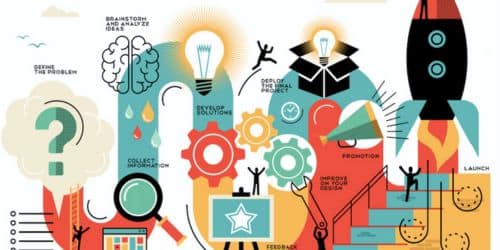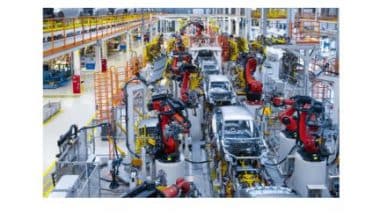Career development has always been one dynamic process individuals take action in shaping their professional growth and success. It emphasizes the importance of self-assessment, goal setting, learning, networking, and adaptability. By engaging in self-reflection and understanding their interests, values, and strengths, individuals can set clear and achievable career goals. Embracing a mindset of lifelong learning and seeking out opportunities for professional development enables individuals to stay current and updated in their fields. This article is created to give explicit information about what career development is all about, the process and guide through which an individual can follow to be able to achieve success.
Career Development
Career development is the ongoing process to develop skills, knowledge, and experience to achieve career goals and advance in a chosen field or profession. It involves knowing your strengths and weaknesses, setting career goals, and taking steps to improve your skills and knowledge through education, training, and work experiences. CD also includes networking, building connections and relationships in your field, and continuous learning and growth. Seeking out mentors and career counselors can also be a valuable part of career development, as they can offer guidance and support to achieve professional goals.
Here are some key aspects of career development:
#1. Self-Assessment
Start by going through your skills, interests, values, and personality traits. Understand your strengths and areas for improvement, as well as what motivates and fulfills you in a work environment.
#2. Goal Setting
Set clear and real short-term and long-term career goals. Your goals may include acquiring new skills, taking on more responsibility, moving into a leadership position, or transitioning to a different field.
#3. Skill Development
Identify the skills and knowledge necessary for your desired career path. Seek opportunities for training, certifications, workshops, or further education to enhance your skill set and stay relevant in your industry.
#4. Networking
Build and maintain a professional network. Attend industry events, join important professional associations, and connect with colleagues, mentors, and professionals in your field. Networking can provide valuable understanding, job leads, and leads for collaboration.
#5. Mentoring and Coaching
Seek guidance from experienced professionals who can offer insights, advice, and support. Mentors and coaches can provide valuable feedback, help you navigate challenges, and assist in your professional growth.
#6. Continuous Learning
Stay updated on industry trends, new technologies, and advancements in your field. Engage in continuous learning through reading industry publications, attending conferences, taking online courses, or always participating in webinars.
#7. Job Search Strategies
Develop effective job search strategies when looking for new opportunities. Update your resume, optimize your online presence (such as LinkedIn), and tailor your applications to each job. Leverage your network and consider using job search platforms and recruitment agencies.
#8. Adaptability
Be open to change and embrace new opportunities. The job market and industries evolve, and being adaptable and flexible can help you navigate career transitions and seize unexpected opportunities.
#9. Work-Life Balance
Strive for a healthy work-life balance that allows you to excel in your career while maintaining personal well-being and fulfillment. Prioritize self-care, set boundaries, and manage your time effectively.
#10. Reflect and Evaluate
Regularly reflect on your progress, evaluate your achievements, and reassess your goals. Adjust your career development plans as needed and remain proactive in pursuing opportunities that align with your aspirations.
Objectives of Career Development
A career development system is a process that enables both parties to accomplish their needs and goals by taking both into account.
#1. Improved Communication among the Organization
Improving communication among the whole organization is the primary goal of building a career development system. At all organizational levels, including between managers and employees, managers and senior management, it fosters communication. The lifeblood of every business is effective communication, which also aids in resolving many significant problems.
#2. Supporting Career Decision
A career development system offers managers and workers useful support for making career decisions. They get the chance to evaluate their abilities and competencies, as well as their objectives and aspirations for the future. It gives them direction so they may concentrate on accomplishing their long-term professional objectives.
#3. Pool of Talented Individuals Development
The key goal of businesses is to develop a pool of talented individuals. After all, a career development system enables businesses to achieve their objectives. They need to meet their workforce demands both now and in the future.
#4. Increasing Employee Career Satisfaction
Organizations specifically construct career development programs to increase employee career satisfaction. They need to comprehend their career needs and expectations from their corporation because they need to keep hold of their precious assets and prepare them for top positions in the future.
#5. Feedback
In order to gauge the degree to which a certain policy has been adopted and measures have been made by the company, feedback must be given at every step. Additionally, it is beneficial for managers to provide feedback to staff members on their performance so that they are aware of the standards that are set for them.
#6. Enhanced Utilization of Employee Skills
Organizations may leverage employee abilities more effectively by using a career development framework. Since managers are aware of their abilities and competences, they may place employees where they will be able to create the most output.
Career Development Plan
Creating a career development plan is a proactive approach to managing your career and ensuring long-term growth and satisfaction.
These steps can be taken to guide your career development:
#1. Self-Assessment:
- Identify your skills, strengths, and areas for improvement.
- Reflect on your interests, values, and long-term career aspirations.
- Consider your personality traits and how they align with different career paths.
#2. Set Goals:
- Define your short-term and long-term career goals.
- Make sure your goals are specific, measurable, achievable, relevant, and time-bound (SMART goals).
- Align your goals with your skills, interests, and values.
#3. Identify Development Opportunities
- Determine the skills and knowledge required to achieve your goals.
- Research training programs, certifications, workshops, or further education can help you acquire those skills.
- Look for projects, assignments, or job rotations that offer learning opportunities within your current organization.
#4. Create an Action Plan
- Break down your development goals into smaller, actionable steps.
- Set deadlines for each step and create a timeline for achieving your goals.
- Identify the resources and support you need to accomplish your action plan.
#5. Seek Support and Mentorship
- Find mentors or coaches who can provide guidance and support in your career journey.
- Seek feedback from supervisors, colleagues, or industry professionals.
- Engage with professional networks and associations to expand your connections.
#6. Implement Your Plan
- Take action on your development goals.
- Attend training programs, pursue further education, or take on challenging assignments.
- Be proactive in seeking opportunities for growth and advancement.
#8. Track Your Progress
- Regularly review and evaluate your progress against your goals.
- Assess your achievements, challenges faced, and lessons learned.
- Make adjustments to your plan as needed.
#9. Continuously Learn and Adapt
- Stay updated on industry trends, advancements, and new opportunities.
- Engage in continuous learning through reading, attending conferences, or taking online courses.
- Be open to new experiences and adapt your plan based on changing circumstances.
#10. Network and Build Relationships
- Build a strong professional network by attending industry events, joining professional associations, or participating in online communities.
- Network with professionals in your field and seek opportunities for collaboration and knowledge-sharing.
#11. Review and Revise Regularly:
- Review and revise your career development plan periodically, considering changes in your goals, interests, or the external environment.
- Stay flexible and adjust your plan as necessary to stay aligned with your evolving career aspirations.
Goals In Career Development
Setting clear and meaningful goals is an essential component of career development. Well-defined goals provide direction, motivation, and a framework for planning and taking action.
Here Are The Types of Goals You Can Set for your Career Development:
- Skill Development Goals
- Promotional Goals
- Educational Goals
- Networking Goals
- Leadership Goals
- Industry Involvement Goals
- Entrepreneurial Goals
- Work-Life Balance Goals
- Financial Goals
- Personal Development Goals
Goals have to be SMART (Specific, Measurable, Achievable, Relevant, and Time-bound) to increase clarity and enhance your ability to track progress.
Career Development Center
Career Development Centers (CDC) are centers that provide individuals with the resources they need to develop their careers. They offer a range of services, including career counseling, job search assistance, resume and cover letter writing, interview preparation, and access to job postings and networking opportunities. CDCs may be located within universities, community centers, or other organizations, and their services are typically available to students and alumni, as well as to the broader community. CDCs aim to empower individuals to make informed decisions about their careers and to provide them with the tools to achieve their goals.
Some things Career Development Centers offer:
- Career Counseling and Guidance
- Assessments and Self-Exploration
- Job Search Assistance:
- Internship and Co-op Programs
- Career Workshops and Events
- Skill Development and Training
- Career Resources and Tools
- Alumni and Employer Relations
- Graduate School Support
- CD Programming
Career Development Center NCSU
North Carolina State University (NCSU) has a Career Development Center (CDC) that provides comprehensive career services and resources to students and alumni. The C DC at North Carolina State University (NCSU) prepares and empowers students to identify and pursue their career goals. The CDC at NCSU offers a wide range of programs and support to assist individuals in exploring career options, developing professional skills, and securing employment opportunities.
North Carolina State University (NCSU) provides the following services at its Career Development Center:
- Career Counseling and Advising
- Job and Internship Search Assistance
- Resume and Cover Letter Support
- Interview Preparation
- Career Fairs and Networking Events
- Professional Development Workshops
- Online Resources and Tool
- Alumni Career Services
What is Career Development?
Career development refers to the ongoing process of managing and advancing one’s career. It involves setting goals, acquiring new skills and knowledge, and seeking opportunities for growth and advancement. Career development involves making strategic decisions to achieve long-term career success and satisfaction. Career development also includes networking, building connections and relationships in your field, and continuous learning and growth.
Why is Career Development Important?
Career development planning is important because it allows individuals to take control of their career paths and helps them proactively pursue their goals. By identifying their strengths and weaknesses and setting career goals, individuals can work towards improving their skills and gaining relevant experience in their desired field. Career planning also allows individuals to make informed decisions about their professional lives, instead of simply reacting to opportunities as they arise.
What Are The Five Stages of Career Development?
The 5 stages of career development can vary depending on the source, but one common model includes:
- Assessment stage: During the assessment stage, individuals identify their interests, values, skills, and strengths.
- Exploration stage: During exploration, individuals gather information about potential career paths and industries.
- Establishment/Maintenance Stage: Establishment involves building experience and developing skills in a chosen field.
- Mid-career stage: Mid-career is a time of growth and advancement.
- Late-career/decline stage: Late-career/decline involves preparing for retirement or transitioning to a different career.
What Are The Four Types of Career Development?
There are several approaches to categorizing the types of career development. One commonly used framework identifies four main types of career development:
- Vertical
- Lateral
- Career Change or Transition
- Entrepreneurship
What Are The Six Key Principles of Career Development?
- The six key principles of career development are:
- Self-awareness
- Opportunity awareness
- Decision making
- Career management
- Lifelong learning
- Resilience.
What Are The 4 Steps In Career Planning?
Different models of career planning outline different steps, but a common one includes 4 steps:
- Self-assessment: identifying your interests, values, strengths, and weaknesses.
- Career exploration: researching potential career paths and industries that align with your interests and strengths.
- Decision-making: using the information gathered from self-assessment and exploration to make informed decisions about career goals and strategies.
- Action planning: developing and implementing a plan to achieve your career goals, which may include gaining new skills and experiences, networking, or job searching.
How Can I Improve My Career Development?
These are various ways individuals can improve their career development:
- Self-Assessment
- Set Clear Goals
- Continuous Learning
- Expand Your Network
- Seek Feedback and Mentorship
- Develop Transferable Skills
- Seize Growth Opportunities
- Embrace Change and Adaptability
- Build a Professional Brand
Conclusion
Improving your career development requires proactive effort and a focus on continuous growth and learning. Here are some strategies to enhance your career development. Building and nurturing a strong professional network can provide valuable insights, mentorship, and new opportunities. It is important to Implement strategies that will empower individuals to take control of their career paths, proactively pursue growth opportunities, and create a solid foundation for long-term success.
Related Articles
- PROFESSIONAL DEVELOPMENT GOALS: Definition and Examples
- EMPLOYEE DEVELOPMENT PLAN: Ultimate Guide on How to Create One With Examples
- NETWORKING EVENTS: Networking Events That Are Realy Worthwhile
- NETWORKING TIPS: 11 Tips To Help You Network Effectively
- IT NETWORKING: Definition, Security, Specialist, Duties, & Salary






